May 2017 national eResearch newsletter
Welcome to the May AeRO eResearch Newsletter
From the AeRO CEO
4-May saw another very successful National Forum, with 90+ attendees from over 50 organisations, and over a dozen speakers from across the eResearch sector, institutions and disciplines. It was clear that the maturity of the entire sector has progressed immensely, even just in the last year. The presentations are all on http://aero.edu.au/forum-2017/.
The Forum provides great input for the research infrastructure roadmap that’s just been released https://www.education.gov.au/2016-national-research-infrastructure-roadmap. The next steps are not yet clear, but the next 6-12 months are once again looking both challenging and exciting for our sector. Keep in touch through AeRO!
Dr Markus Buchhorn, AeRO CEO.
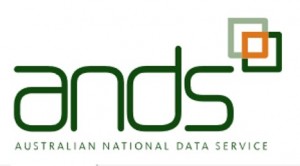 |
Management and Publication of Health and Medical Data
ANDS is running a series of three short 30 minute webinars about Health and Medical data. These webinars are free and are being recorded. If you can’t attend (or the date has passed) please contact us (kate.lemay@ands.org.au) and we will send you the recording and handout links. – Funders and Publishers: What is being asked of researchers? (9-May) |
 |
Drones and Big Spatial Data – Challenges and Opportunities: Fri, 16 June, 09:15-16:45
ANDS is running this seminar to foster best practice and new developments in the field of unmanned aerial vehicles, big spatial data and ethics. There will be presentations from AuScope, ANU Fenner School, NCI, Data.gov.au, AURIN and BCCVL, and several hands-on sessions about Australian spatial data discovery and access platforms, VLs for big spatial data, and collaborative research workflows. It will also cover big data visualisation, analysing big spatial datasets, and drone data modelling. Location: ANU, MacDonald Room, Menzies Building 2, McDonald Place, Acton, ACT. For more information and to register: https://dronesdata.eventbrite.com.au |
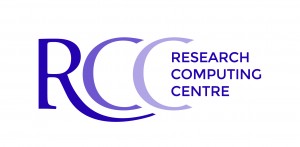 |
Pilot of UQ’s Innovative Research Data Management System Underway
Testing of a new, world-leading system in collaborative research data management infrastructure has begun at The University of Queensland. The UQ Research Data Manager has been built to be researcher-centric and user friendly. Early feedback from researchers indicates they are pleased with the system’s data sharing capacity and level of control they have over access to their research data with minimum administrative burden. Read more: https://rcc.uq.edu.au/article/2017/04/pilot-uq%E2%80%99s-innovative-research-data-management-system-underway. |
| 5th Workshop on Sustainable Software for Science: Practice and Experiences
Call for Submissions: due 30-Jun-17. |
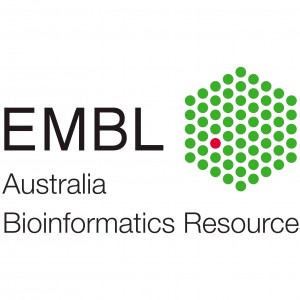 |
EMBL-ABR’s Genome Annotation and Open Science Workshop Series
Monica Munoz-Torres, Biocuration Lead and Bioinformatics Scientist at Lawrence Berkeley National Laboratory, where she works in the Berkeley Bioinformatics Open-Source Projects group, will be touring Australia over June/July presenting workshops across EMBL-ABR Nodes in Melbourne, Hobart, Townsville, Sydney, Brisbane and Perth. As well as consulting with local researchers on their own research challenges, Monica will offer workshops tailored for each location in partnership with local presenters who will lead the hands-on exercises and discussions. For more details about Monica see http://www.berkeleybop.org/people/monica-munoz-torres/. |
 |
eResearch-Australasia Conference 2017 Call for Participation Open
We invite you to present at the 11th eResearch Australasia Conference being held at the Brisbane Convention and Exhibition Centre, 16-20 October 2017. eResearch 2017 will offer delegates the opportunity to engage, connect, and share their ideas and exemplars concerning new eResearch capabilities, and how information and communication technologies help researchers to collaborate, collect, manage, share, process, analyse, store, find, understand and re-use information. For more information go to https://conference.eresearch.edu.au/registration-2017/. |
 |
AARNet’s Network Connection to Asia to be Boosted
AARNet, Google, Indosat Ooredoo, Singtel, SubPartners, and Telstra announced on 6-Apr-17 that they have made an agreement for Alcatel Submarine Networks (ASN) to build an international subsea cable system that will connect Singapore to Perth and Sydney, expected to be completed by mid-2019. Consortium members, including AARNet, will have spectrum ownership providing the ability to independently take advantage of technology advancements and future upgrades as required. Using today’s coherent optical technology, each of the two-fibre pairs will have a minimum capacity of 18 terabits per second. Read the full story at https://news.aarnet.edu.au/new-subsea-cable-to-provide-additional-connectivity-between-australia-and-south-east-asia/. |
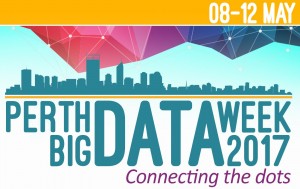 |
The End of Perth Big Data Week 2017!
Perth Big Data Week 2017 ran from May 8 – 12 2017, highlighting the importance of big data and its expanding influence on society and industry. The event was hosted by various organisations around Perth, discussing their perspective and influences of big data. Discussions were held by a number of Western Australia’s leaders in big data including science, government, industry and academia. To read a full summary of Perth Big Data Week 2017, go to https://www.pawsey.org.au/2017/05/the-end-of-perth-big-data-week-2017/. |
 |
Program and Speakers Announced for 2017 UQ Winter School.
This year’s University of Queensland-based Winter School in Mathematical & Computational Biology, 3–7 July, will feature Professor John Quackenbush from the Harvard School of Public Health and Dana-Farber Cancer Institute, who last spoke at the Winter School in 2015, at which he received a popular vote speaker prize. This time he will speak about using networks to link genotype to phenotype. Other international speakers lined up for the event include Associate Professor Nicole Cloonan of the University of Auckland and Dr Helen Kilpinen of University College London. Read more: https://rcc.uq.edu.au/article/2017/04/program-and-speakers-announced-uq-based-2017-winter-school. |
| The Bulletin Digitised and Available on Trove
The first six years of The Bulletin magazine, which ran from 1880 to 2008, have been digitised and made accessible online by the National Library of Australia through Trove. The digitisation was made possible with the support of the State Library of NSW and the online research and publishing tool, AustLit. Further issues of The Bulletin are to be digitised with the assistance of the Federal Government’s Modernisation Fund. Trove harvested a total of 15,043 article level records from The Bulletin for this release. Browse the collection at http://nla.gov.au/nla.obj-68375465. |
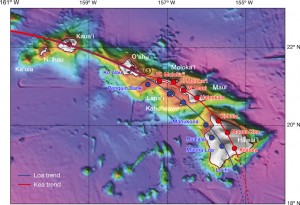 |
Scientists Discover how World’s Biggest Volcanoes Formed
A study led by The Australian National University (ANU) has solved the 168-year-old mystery of how the world’s biggest and most active volcanoes formed in Hawaii. The researchers worked with NCI to model the Pacific Plate’s change in direction and formation of the twin volcanic tracks through Hawaii, as well as to produce scientific visualisations of the model outputs. You can see the visualisation on Youtube here: https://www.youtube.com/watch?v=88XqpB4LDAA and read more about the story here: http://nci.org.au/2017/05/04/scientists-discover-worlds-biggest-volcanoes-formed/. |
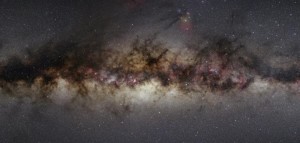 |
GLEAM: A Panoramic View of the Universe in Colour
In searching for cosmic events and the evolution of our solar system, radio astronomers have traditionally surveyed only segments of the sky. Recently, the GaLactic and Extragalactic All-sky Murchison Widefield Array survey (GLEAM) project has collected and processed enough data to survey the entire Southern sky in “radio colour”! Using the Murchison Widefield Array (MWA) telescope, and the world-class facilities at Pawsey Supercomputing Centre, the GLEAM survey has produced the first multi-coloured panoramic view of the universe. More information about GLEAM and MWA can be found at https://www.pawsey.org.au/case-study/gleam-a-panoramic-view-of-the-universe-in-colour/. |
 |
Improving Gas Turbines for a Cleaner Planet
Professor Hawkes (UNSW) is leading a team of researchers to maximise gas turbine combustion efficiency using the world-class infrastructure at Pawsey Supercomputing Centre. The gas turbine is a technology used in aviation and for power generation. When used for power generation, it is a technology that enables high penetration renewable energy due to its fast starting capability, providing rapid generation when renewables are not available. Global trends of heightened fuel prices, clean air regulations, biofuels and greenhouse gas awareness are driving scientists to find answers to cleaner energy technologies. Read more at https://www.pawsey.org.au/wp-content/uploads/2016/12/EvattHawkes_combustion_UNSWNov2016.pdf. |
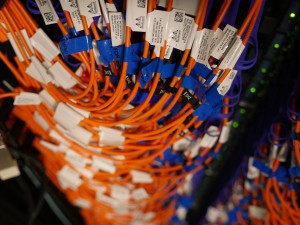 |
New Flagship Allocations Recognise Outstanding Australian Science
NCI is pleased to announce that two ARC Centres of Excellence have been added to its Flagship Scheme, in recognition of their commitment to high-impact science in Australia. These are the ARC Centre of Excellence in Future Low-Energy Electronics Technologies (FLEET) and the ARC Centre of Excellence in Exciton Science (ACEx). Read more about their involvement with NCI here: http://nci.org.au/2017/03/27/new-flagship-allocations-recognise-outstanding-australian-science/. |
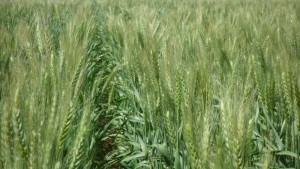 |
Groundbreaking Wheat Genome Research
Australian researchers have made a discovery in bread wheat that promises to ‘shake the foundations’ of wheat gene research and open up big opportunities for wheat breeders across the world. A team of researchers at the University of Western Australia have found 21,000 new genes across 16 common wheat varieties, which are anticipated to have immediate relevance to wheat breeders in Australia. Professor of Plant Biology David Edwards said knowing there was a variation between genes could help in creating disease resistant varieties. A full article on the research can be seen at http://www.abc.net.au/news/rural/2017-03-09/researchers-find-new-bread-wheat-genes/8337326. |
| Time to Cleanup Your Files on Galaxy-qld
Galaxy-qld user numbers are growing rapidly, with more than 130 new people registered in March 2017 alone. It is fantastic to see this uptake, however the success has put serious pressure on its data storage capacity. To ease this pressure, all users are reminded to download their results and delete old, unneeded or duplicate files on Galaxy-qld. The server is currently designed for data analysis, not long-term data storage. If you require long-term data storage, please consider an allocation on QRIScloud, or check with your institution for other storage options. Read more: https://www.qcif.edu.au/index.php/news/289-time-to-cleanup-your-files-on-galaxy-qld. |
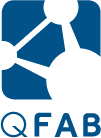 |
QFAB Celebrates its 10th Anniversary
QFAB Bioinformatics is celebrating its 10th birthday and a decade of providing leading bioinformatics services to life science and health researchers. Established in 2007 in Brisbane, QFAB has matured into a team of 10, comprising bioinformaticians, biostatisticians and software developers. This diversity underpins QFAB’s capacity to apply new skills and approaches to a project, to implement the most effective solutions and unlock the full value of data. Read more: https://www.qcif.edu.au/index.php/news/288-qfab-celebrates-its-10th-anniversary. |
Contributions
This newsletter is based on contributions provided by members of the eResearch community, and draws on news articles and newsletters published across the sector. The Newsletter is published around the 16th of each month. Please send any contributions (max. 150 words, plus a link and image) or pointers to any other relevant articles or newsletters to editor@aero.edu.au
Archives of these Newsletters are held at http://aero.edu.au/newsletters/.
Click HERE to add yourself to the eResearch Mailing List.
Thanks,
—AeRO Newsletter Editor

